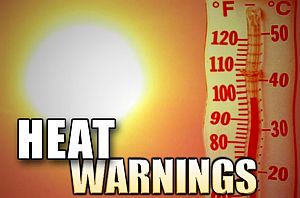M.C. EMA Warns of Excessive Heat on Thursday
June 27, 2012
 06/28/12 The National Weather Service has issued an Excessive Heat Warning which will be in effect from 11am until 8:00pm on Thursday, June 28. Air temperatures and heat index values will range from 103 to 107 degrees. This type of excessive heat will pose a risk for heat stress for those with outdoor activities.
06/28/12 The National Weather Service has issued an Excessive Heat Warning which will be in effect from 11am until 8:00pm on Thursday, June 28. Air temperatures and heat index values will range from 103 to 107 degrees. This type of excessive heat will pose a risk for heat stress for those with outdoor activities.
Clyde Avery, Director of the Marshall County Emergency Management Agency would like to remind everyone to be prepared for the higher temperatures.
Be prepared for heat emergencies by knowing what to do if high temperatures are expected.
For example:
- Slow down. Avoid strenuous activity. If you must do strenuous activity, try to do it during the coolest part of the day.
- Stay indoors as much as possible. If air conditioning is not available, stay on the lowest flour out of the sunshine. Try to get to a public building with air conditioning. Remember, electric fans do not cool the air, but they do help sweat evaporate, which cools the body.
- Wear lightweight, light colored clothing. Light colors will reflect away some of the sun’s energy.
- WEAR SUN BLOCK and other UV protection (hat, sunglasses).
- DRINK PLENTY OF WATER. Your body needs water to keep cool. Water is the safest liquid to drink during heat emergencies. Avoid drinks which contain alcohol and caffeine.
- Eat small meals and eat more often. Avoid foods that are high in protein, which increase metabolic heat.
- Avoid using salt or salt tablets unless directed to do so by a physician.
- NEVER leave children and pets inside vehicles under any circumstances.
- Check on relatives and neighbors who are elderly or who may have health problems and may be more susceptible to the heat.
Learn the signals of heat emergencies.
For example:
- Heat Exhaustion: Cool, moist, pale, or flushed skin; heavy sweating; headache; nausea or vomiting; dizziness; and exhaustion. Body temperature will be near normal.
- Heat Stroke: Hot, red skin; changes in consciousness; rapid weak pulse; and rapid shallow breathing. Body temperature can be very high- as high as 105 degrees F. If the person was sweating from heavy work or exercise, skin may be wet; otherwise it will feel dry.
Know how to treat heat emergencies.
For example:
- Heat Cramps: Get the person to a cooler place and have them rest in a comfortable position. Lightly stretch the affected muscle and replenish fluids. Give a half a glass of cool water every 15 minutes. Do not give liquids with alcohol or caffeine in them, as they can make conditions worse.
- Heat Exhaustion: Get the person out of the heat and into a cooler place. Remove or loosen tight clothing and apply cool, wet cloths. Give the person cool water to drink. Make sure the person drinks slowly. Give a half a glass of cool water every 15 minutes. Do not give liquids that contain alcohol and caffeine. Let the person rest and watch carefully for changes in their condition.
- Heat Stroke. Heat stroke is a life-threatening situation. Help is needed fast. Call 911 or your local emergency number. Move the person to a cooler place. Watch for signs of breathing problems. Keep the person lying down and try to cool the body any way you can until emergency personnel arrive.
Don’t forget pets:
- Provide shade and plenty of fresh water, or if possible, bring them indoors.
For more information contact the Marshall County Emergency Management Agency at 574-936-3740.
 06/28/12 The National Weather Service has issued an Excessive Heat Warning which will be in effect from 11am until 8:00pm on Thursday, June 28. Air temperatures and heat index values will range from 103 to 107 degrees. This type of excessive heat will pose a risk for heat stress for those with outdoor activities.
06/28/12 The National Weather Service has issued an Excessive Heat Warning which will be in effect from 11am until 8:00pm on Thursday, June 28. Air temperatures and heat index values will range from 103 to 107 degrees. This type of excessive heat will pose a risk for heat stress for those with outdoor activities.